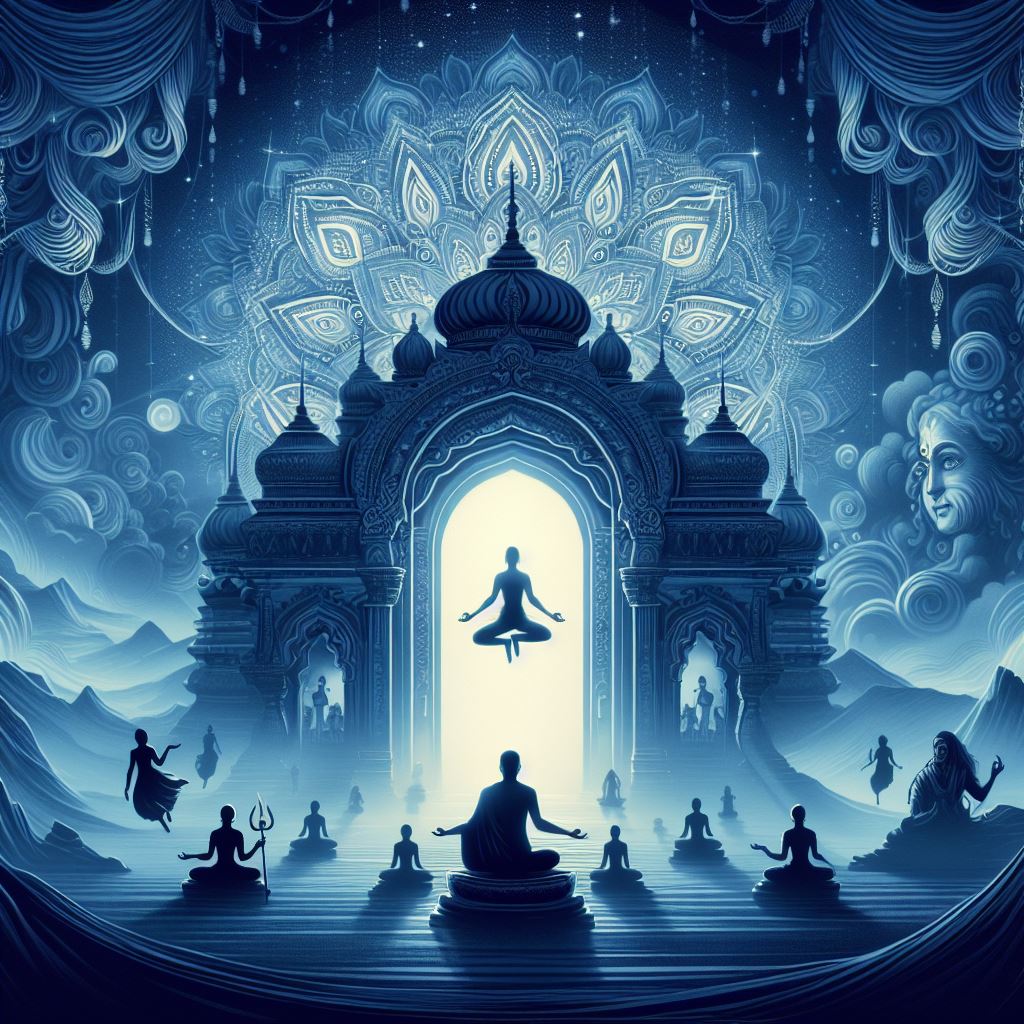The seventh chapter of the Bhagavad Gita is Gyaan Vigyana Yoga . In this chapter, Krishna reveals that he is the Supreme Truth, the principal cause and the sustaining force of everything. He reveals his illusionary energy in this material world called Maya, which is very difficult to overcome but those who surrender their minds unto Him attain Him easily. He also describes the four types of people who surrender to Him in devotion and the four kinds that don’t. Krishna confirms that He is the Ultimate Reality and those who realize this Truth reach the pinnacle of spiritual realization and unite with the Lord.
slok:’7.1′,
‘śrībhagavānuvāca . mayyāsaktamanāḥ pārtha yogaṃ yuñjanmadāśrayaḥ . asaṃśayaṃ samagraṃ māṃ yathā jñāsyasi tacchṛṇu ||7-1||’,
‘7.1 The Blessed Lord said O Arjuna, hear how you shall without doubt know Me fully, with the mind intent on Me, practising Yoga and taking refuge in Me.’,
slok:’7.2′,
‘jñānaṃ te.ahaṃ savijñānamidaṃ vakṣyāmyaśeṣataḥ . yajjñātvā neha bhūyo.anyajjñātavyamavaśiṣyate ||7-2||’,
‘7.2 I shall declare to thee in full this knowledge combined with realisation, after knowing which nothing more here remains to be known.’,
slok:’7.3′,
‘manuṣyāṇāṃ sahasreṣu kaścidyatati siddhaye . yatatāmapi siddhānāṃ kaścinmāṃ vetti tattvataḥ ||7-3||’,
‘7.3 Among thousands of men, one perchance strives for perfection; even among those successful strivers, only one perchance knows Me in essence.’,
slok:’7.4′,
‘bhūmirāpo.analo vāyuḥ khaṃ mano buddhireva ca . ahaṃkāra itīyaṃ me bhinnā prakṛtiraṣṭadhā ||7-4||’,
‘7.4 Earth, water, fire, air, ether, mind, intellect and egoism thus is My Nature divided eightfold.’,
slok:’7.5′,
‘apareyamitastvanyāṃ prakṛtiṃ viddhi me parām . jīvabhūtāṃ mahābāho yayedaṃ dhāryate jagat ||7-5||’,
‘7.5 This is the inferior Prakriti, O mighty-armed (Arjuna); know thou as different from it My higher Prakriti (Nature), the very life-element, by which this world is upheld.’,
slok:’7.6′,
‘etadyonīni bhūtāni sarvāṇītyupadhāraya . ahaṃ kṛtsnasya jagataḥ prabhavaḥ pralayastathā ||7-6||’,
‘7.6 Know that these two (Natures) are the womb of all beings. So I am the source and dissolution of the whole universe.’,
slok:’7.7′,
‘mattaḥ parataraṃ nānyatkiñcidasti dhanañjaya . mayi sarvamidaṃ protaṃ sūtre maṇigaṇā iva ||7-7||’,
‘7.7 There is nothing whatsoever higher than Me, O Arjuna. All this is strung on Me, as clusters of gems on a string.’,
slok:’7.8′,
‘raso.ahamapsu kaunteya prabhāsmi śaśisūryayoḥ . praṇavaḥ sarvavedeṣu śabdaḥ khe pauruṣaṃ nṛṣu ||7-8||’,
‘7.8 I am the sapidity in water, O Arjuna; I am the light in the moon and the sun; I am the syllable Om in all the Vedas, sound in ether and virility in men.’,
slok:’7.9′,
‘puṇyo gandhaḥ pṛthivyāṃ ca tejaścāsmi vibhāvasau . jīvanaṃ sarvabhūteṣu tapaścāsmi tapasviṣu ||7-9||’,
‘7.9 I am the sweet fragrance in the earth and the brilliance in the fire, the life in all beings, and I am the austerity in ascetics.’,
slok:’7.10′,
‘bījaṃ māṃ sarvabhūtānāṃ viddhi pārtha sanātanam . buddhirbuddhimatāmasmi tejastejasvināmaham ||7-10||’,
‘7.10 Know Me, O Arjuna, as the eternal seed of all beings; I am the intelligence of the intelligent; the splendour of the splendid objects am I.’,
slok:’7.11′,
‘balaṃ balavatāṃ cāhaṃ kāmarāgavivarjitam . dharmāviruddho bhūteṣu kāmo.asmi bharatarṣabha ||7-11||’,
‘7.11 Of the strong, I am the strength devoid of desire and attachment, and in (all) beings, I am the desire unopposed to Dharma, O Arjuna.’,
slok:’7.12′,
‘ye caiva sāttvikā bhāvā rājasāstāmasāśca ye . matta eveti tānviddhi na tvahaṃ teṣu te mayi ||7-12||’,
‘7.12 Whatever beings (and objects) that are pure, active and inert, know that they proceed from Me. They are in Me, yet I am not in them.’,
slok:’7.13′,
‘tribhirguṇamayairbhāvairebhiḥ sarvamidaṃ jagat . mohitaṃ nābhijānāti māmebhyaḥ paramavyayam ||7-13||’,
‘7.13 Deluded by these Natures (states or things) composed of the three alities of Nature all this world does not know Me as distinct from them and immutable.’,
slok:’7.14′,
‘daivī hyeṣā guṇamayī mama māyā duratyayā . māmeva ye prapadyante māyāmetāṃ taranti te ||7-14||’,
‘7.14 Verily, this divine illusion of Mine, made up of the (three) alities (of Nature) is difficult to cross over; those who take refuge in Me alone, cross over this illusion.’,
slok:’7.15′,
‘na māṃ duṣkṛtino mūḍhāḥ prapadyante narādhamāḥ . māyayāpahṛtajñānā āsuraṃ bhāvamāśritāḥ ||7-15||’,
‘7.15 The evil-doers and the deluded who are the lowest of men do not seek Me; they whose knowledge is destroyed by illusion follow the ways of demons.’,
slok:’7.16′,
‘caturvidhā bhajante māṃ janāḥ sukṛtino.arjuna . ārto jijñāsurarthārthī jñānī ca bharatarṣabha ||7-16||’,
‘7.16 Four kinds of virtuous men worship Me, O Arjuna, and they are the distressed, the seekr of knowledge, the seekr of wealth and the wise, O lord of the Bharatas.’,
slok:’7.17′,
‘teṣāṃ jñānī nityayukta ekabhaktirviśiṣyate . priyo hi jñānino.atyarthamahaṃ sa ca mama priyaḥ ||7-17||’,
‘7.17 Of them the wise, ever steadfast and devoted to the One, excels (is the best); for I am exceedingly dear to the wise and he is dear to Me.’,
slok:’7.18′,
‘udārāḥ sarva evaite jñānī tvātmaiva me matam . āsthitaḥ sa hi yuktātmā māmevānuttamāṃ gatim ||7-18||’,
‘7.18 Noble indeed are all these; but I deem the wise man as My very Self; for, steadfast in mind he is established in Me alone as the supreme goal.’,
slok:’7.19′,
‘bahūnāṃ janmanāmante jñānavānmāṃ prapadyate . vāsudevaḥ sarvamiti sa mahātmā sudurlabhaḥ ||7-19||’,
‘7.19 At the end of many births the wise man comes to Me, realising that all this is Vaasudeva (the innermost Self); such a great soul (Mahatma) is very hard to find.’,
slok:’7.20′,
‘kāmaistaistairhṛtajñānāḥ prapadyante.anyadevatāḥ . taṃ taṃ niyamamāsthāya prakṛtyā niyatāḥ svayā ||7-20||’,
‘7.20 Those whose wisdom has been rent away by this or that desire, go to other gods, following this or that rite, led by their own nature.’,
slok:’7.21′,
‘yo yo yāṃ yāṃ tanuṃ bhaktaḥ śraddhayārcitumicchati . tasya tasyācalāṃ śraddhāṃ tāmeva vidadhāmyaham ||7-21||’,
‘7.21 Whatsoever form any devotee desires to worship with faith that (same) faith of his I make firm and unflinching.’,
slok:’7.22′,
‘sa tayā śraddhayā yuktastasyārādhanamīhate . labhate ca tataḥ kāmānmayaivavihitānhi tān ||7-22||’,
‘7.22 Endowed with that faith, he engages in the worship of that (form) and from it he obtains his desire, these being verily ordained by Me (alone).’,
slok:’7.23′,
‘antavattu phalaṃ teṣāṃ tadbhavatyalpamedhasām . devāndevayajo yānti madbhaktā yānti māmapi ||7-23||’,
‘7.23 Verily the reward (fruit) that accrues to those men of small intelligence is finite. The worshippers of the gods go to them, but My devotees come to Me.’,
slok:’7.24′,
‘avyaktaṃ vyaktimāpannaṃ manyante māmabuddhayaḥ . paraṃ bhāvamajānanto mamāvyayamanuttamam ||7-24||’,
‘7.24 The foolish think of Me, the Unmanifest, as having manifestation, knowing not My higher, immutable and most excellent nature.’,
slok:’7.25′,
‘nāhaṃ prakāśaḥ sarvasya yogamāyāsamāvṛtaḥ . mūḍho.ayaṃ nābhijānāti loko māmajamavyayam ||7-25||’,
‘7.25 I am not manifest to all (as I am) veiled by the Yoga-Maya. This deluded world does not know Me, the unborn and imperishable.’,
slok:’7.26′,
‘vedāhaṃ samatītāni vartamānāni cārjuna . bhaviṣyāṇi ca bhūtāni māṃ tu veda na kaścana ||7-26||’,
‘7.26 I know, O Arjuna, the beings of the past, the present and the future, but no one knows Me.’,
slok:’7.27′,
‘icchādveṣasamutthena dvandvamohena bhārata . sarvabhūtāni sammohaṃ sarge yānti parantapa ||7-27||’,
‘7.27 By the delusion of the pairs of opposites arising from desire and aversion, O Bharata, all beings are subject to delusion at birth, O Parantapa.’,
slok:’7.28′,
‘yeṣāṃ tvantagataṃ pāpaṃ janānāṃ puṇyakarmaṇām . te dvandvamohanirmuktā bhajante māṃ dṛḍhavratāḥ ||7-28||’,
‘7.28 But those men of virtuous deeds whose sins have come to an end, and who are freed from the delusion of the pairs of opposites, worship Me, steadfast in their vows.’,
slok:’7.29′,
‘jarāmaraṇamokṣāya māmāśritya yatanti ye . te brahma tadviduḥ kṛtsnamadhyātmaṃ karma cākhilam ||7-29||’,
‘7.29 Those who strive for liberation from old age and death, taking refuge in Me, realise in full ï1thatï1 Brahman, the whole knowledge of the Self and all action.’,
slok:’7.30′,
‘sādhibhūtādhidaivaṃ māṃ sādhiyajñaṃ ca ye viduḥ . prayāṇakāle.api ca māṃ te viduryuktacetasaḥ ||7-30||’,
‘7.30 Those who know Me with the Adhibhuta (pertaining to the elements), Adhidaiva (pertaining to the gods) and the Adhiyajna (pertaining to the sacrifice) know Me even at the time of death, steadfast in mind.’,
slok:’7.31′,
‘OM tatsaditi śrīmadbhagavadgītāsūpaniṣatsu brahmavidyāyāṃ yogaśāstre śrīkṛṣṇārjunasaṃvāde jñānavijñānayogo nāma saptamo.adhyāyaḥ ||7-31||’,
‘Swami Sivananda did not comment on this sloka’,

